Oct 21, 2011 by TeeGee
I admit that I didn’t care much about player choices up until recently. A strongly directed experience is usually better than a diluted one with a few (often meaningless) options to pick. The player gets to see only one story at a time, so it better be as good as possible. And frankly, most modern games don’t do choices very well either, usually limiting them to binary moral dilemmas tied to some simplistic karma system.
Working on Cinders required me to revise my approach, though. As a visual novel, the game is all about the choices and experiencing a different story each time you play. Without this aspect, you would be better off just reading a book.
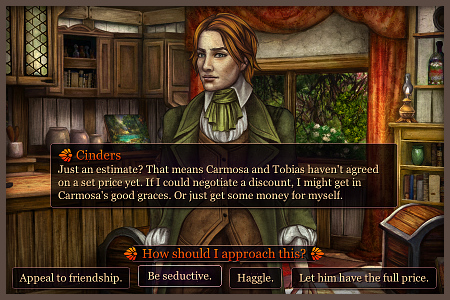
It made me think a lot about what makes a good branching storyline, and how to make player agency as enjoyable as possible. As I wrote before, I’m a competitive beast, driven by the ambition to 1-up what’s already there, and I really wanted to get this aspect right.
I started forming a loose list of guidelines we want to follow, based on what worked (or didn’t work) in other games I played, and on our own experimentation.
Make all choices viable.
I recently played Deus Ex: Human Revolution. As its predecessors, the game makes big fuss about the player’s freedom. Jensen — the protagonist — can be a ninja, a diplomat, a hacker, or a killing machine. You can play however you want. In theory. In reality… not so much.
At first, I wanted to be a common sense Jensen. Stealthy when necessary, but not shying away from direct assault if the odds are in his favor. When I finished the first mission, I had around 4k experience, no level ups, and I was scolded by every NPC around.
I decided to try again using the stealthy approach, to see how it changes things. This time, I knocked every opponent down silently, checked every hidden vent shaft, and avoided any direct confrontation. It actually ended up being easier (and more tedious) than the first playthrough, as the AI isn’t very bright and your character is pretty fragile in combat.
I finished the first mission with 9k experience, two level ups, and two unlocked small side-quests. Right…
For a game that encourages freedom of choice, it surely made one of the alternatives way more optimal than the other. I want to avoid that in our games.
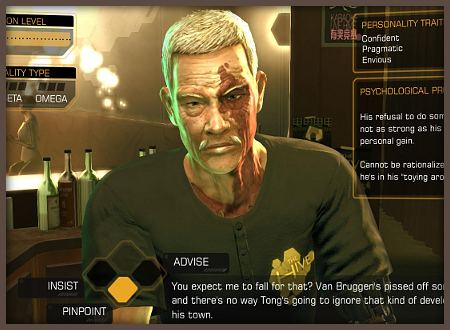
I’ve set myself a goal to make every choice viable and interesting to pick. Especially as it’s a story-based game. There’s no “strategy” or “challenge” here. You’re just experiencing a certain story and shaping it to your liking. One person’s story should be different than the other’s — but not better or worse.
It doesn’t mean we don’t have any “bad” options, or ones that may not be the right course of action for the presented circumstances. But we attempt to make them viable by allowing them to create interesting situations or give new insights into some character’s personality. We don’t want the player to ever feel like they just picked the wrong option and should load the game. Whatever they do, it should still make for a good story.
A simple example of this approach is right at the start of the game, when the Stepmother tasks Cinders with retrieving something from the local merchant. On her way, Cinders may visit several places, meet some characters and progress a few story arcs. Or she may just skip right to her destination and get back.
Clearly, the second option makes the player see less of the game’s content and could be considered sub-optimal. To prevent that, we’ve made it so that if Cinders gets back early, she manages to impress the Stepmother with her efficiency, which can lead to a whole different story arc. So while the player may have sacrificed a part of the content, they are rewarded with some cool scenes that they would otherwise miss.
Allow for flavor choices.
By “flavor”, I mean choices that don’t have much gameplay weight but allow you to add some touch to your character’s personality. Role playing, basically.
One thing I adore in the first two Fallouts (one of my favorite games of all time, even if they didn’t age very gracefully), is that they had a very broad set of dialogue options for almost every conversation. Even when accepting a quest, you could reply in many more ways than a simple “Yes” or “No”. You could be heroic, cynical, a tough mercenary, an annoying wise guy, or you could try to seduce the guy for more info and rewards. It still lead to the same quest, but allowed you to shape your character’s “image” to your liking.
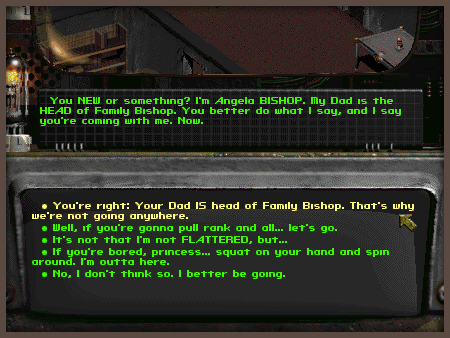
Availability of many of these options depended on your stats and karma. A stupid character could barely make a coherent sentence (playing a total dumbass was a great challenge in itself), a charismatic genius had a broad range of differently flavored responses, while an expert scientist could ask for some advanced technical details.
It went a long way in allowing for some good old roleplaying, and gave the game a huge replayability factor. I played it as a classic Mad Max-like mercenary, as a sleazy female manipulator, as a focused martial artist in vein of Bruce Lee movies, and as a psychotic drug-addicted killer.
AAA games don’t do that anymore. They usually use a much simpler solution, where you have three clear answers to every situation — good, bad, and neutral. Often tied to some karma system.
It’s understandable. These games need to keep mass-market appeal, and mass-market doesn’t like to read too much. It would also cost a crazy amount of money to record and animate all these different dialogue options — something that older games didn’t have to worry about as much.
Cinders — and visual novels in general — are not big budget AAA molochs however, and we have way more flexibility here.
I want to give players a chance to play any Cinders they want. Differing from other people’s interpretation of Cinders. Not only in actions but also in the way she thinks and speaks. Besides plot-critical choices, we offer many that are simple role playing.
For example: when one of the stepsisters teases Cinders by implying she surely dreamed about a handsome prince or something equally silly, we get the option to either ignore her remark, take offense at it, admit it may be true, or turn it against her. Does it alter the story in any meaningful way? Well, it adds some points to a secret variable storing Cinders’ personality, that is later used to determine the ending, but not much more.
It’s too minor to significantly affect the plot, but it allows the player to define Cinders as a romantic dreamer, disillusioned realist, or something in between. It doesn’t cost us much to add these few extra lines, but it adds actual value for the player.
Leave all important decisions to the player.
I’ve made this rule after playing Bionic Heart. It’s a sci-fi romance VN by our friends at WinterWolves. I went through it as a part of my research, when we were just starting out. It was fun overall, but there was one moment that really irked me.
The plot resolves around a mysterious cyborg (who happens to be a beautiful woman… of course), who appears at the protagonist’s door one day. It results in an investigation about the cyborg’s origin, and potentially in a somewhat creepy romance.
I was aiming for the romance option, trying to please the robot by discovering as much about her past as possible. Pretty far into the game, when I got our “relationship bar” to the max, the cyborg started to behave clearly affectionate towards the protagonist. It seemed like the romance plot was clearly heading for its resolution…
And then, suddenly, my character stated that he doesn’t find her attractive anymore, now that he knows how she works. And ended the relationship. This wasn’t a choice made by me — the game just told me: “Sorry, bro. You changed your mind”. I was pissed. Why an important decision is made for me, when I was clearly in control of my character up to this point?
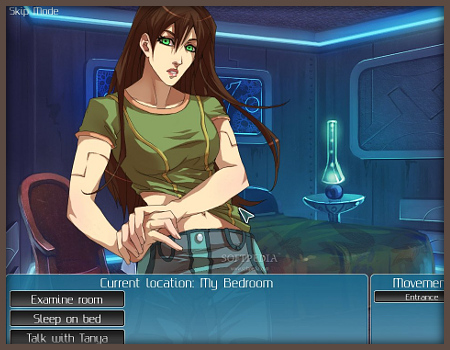
I try to be very careful not to make the same mistake by leaving all the important decisions to the player. It’s not easy sometimes. Especially when I want Cinders to be at some place and time in every playthrough, regardless of the chosen option. Some cool scenes actually emerged from moments when I just couldn’t think of anything, and had to include the “what if the player doesn’t want to go there” option.
Choices should be clear.
This is a simple one. I hate when I pick an option in a game, thinking this will make my character do A. And then he ends up doing B, because the designer’s interpretation of what’s my choice was different from mine. Sometimes it’s even intentional. Supposed to keep the players on their toes, add a bit of realism to the game. It ends up with a short trip to the Load Game menu either way.
Some of those L.A. Noire interrogations are a good example here. Sometimes, you clearly think you just caught your witness lying about something. But when you press the “Lie” button, the protagonist suddenly becomes strangely violent and accuses the subject of something completely unrelated, leaving you with a funny WTF impression on your face.
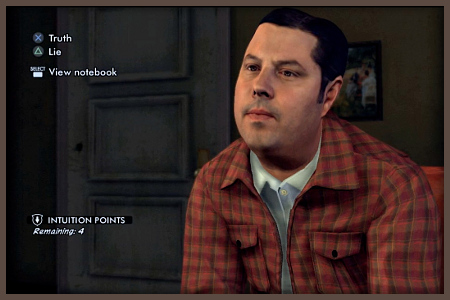
To some extent it’s unavoidable. People think differently and make different connections in their minds. You can’t predict if what seems like a transparent decision for you is going to be as transparent for someone else. But we’ve made a rule to at least try to make it always clear what you are choosing and what the outcome may be.
If you decide to be nice to someone, it will probably have a positive effect on your relationship. If you click “Be seductive” you will do just that. And if choosing a particular option may have significant repercussions, we try to indicate that it’s a possibility through earlier dialogue.
I think it’s important to let the player feel they are in full control of their character’s actions. It’s the visual novel equivalent of making sure that controls in a platformer game are tight.
Acknowledge player’s choices.
Playing games is largely about the rewards. In casual games, every right action is accompanied by a nice effect, pleasant sound cue, and an increase in score. In Mario, collecting 100 coins rewards you with a 1-up. In RPGs, you get experience points for killing monsters. And so on.
It makes game more entertaining and — well — rewarding to play. We like our efforts to be appreciated, and it makes us want to come for more.
It gets a bit less obvious in story-centric games. Often, the story or the dialogue itself are the reward for your actions. A simple and very direct example is an NPC thanking you for saving his village in an RPG.
A more subtle — and often more rewarding — method is to add small acknowledgments of player’s actions to otherwise mundane dialogues.
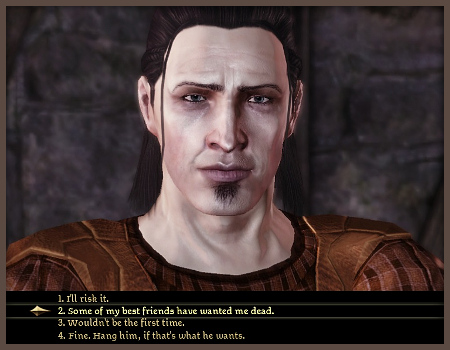
We keep track of most of the decisions the player makes, and add some extra lines here and there. For example: in one scene, the Prince is talking with the Captain of the Guard about his problems with finding the right wife. It’s just a short cutscene that goes always in the same way and serves to establish the Prince.
However, if the player chose the course of action in which Cinders meets the Captain, it makes him add a few lines about an interesting girl he just met. It serves no plot purpose, but it feels nice that the game acknowledges what you did.
It’s like when an old friend suddenly remembers about your birthday and calls you with wishes. A simple gesture that doesn’t cost him much but makes you feel happy nevertheless.
Of course, I don’t want to get all cocky and say that this is the definite list of what makes player choices in games good, or that it works for every game out there. We’re still figuring this out ourselves, and there’s certainly a lot to learn yet. I bet that after we release Cinders, we’ll discover a whole world of issues that we haven’t even thought of yet.
Still, I thought it may be worth to share our list. Maybe you guys will find it helpful, or maybe you have something to add.
Oct 13, 2011 by TeeGee
My life is slowly getting back into balance, and I finally got more time to write. It seems like the right time to revive the blog! Google Analytics also says it’s good for our traffic ;).
With such a long period of silence, I guess I owe you an honest update regarding our recent circumstances.
Cinders:
I bet that a lot of you just want to know how Cinders is going, and are we really working on it as hard as we can. Short answer: yes.
Basically, I’m not doing anything else at this point. Aside from the occasional session of Demon’s Souls in the evening, I spend my working days writing the remaining scene descriptions. A sort of “screenplay” for the game. With each scene, scenario and dialogue line listed and outlined. It looks like this:
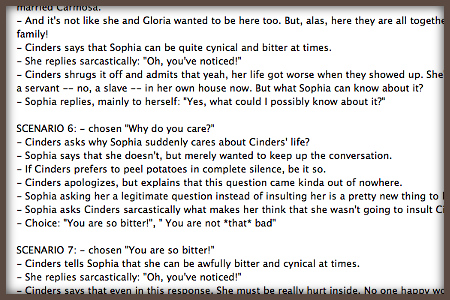
These descriptions are then sent to Ayu, who uses them to write actual scene scripts used in-game.
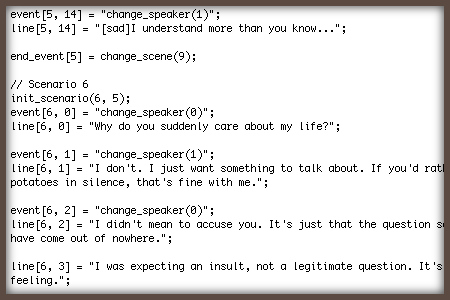
I admit I underestimated the amount of time and effort that goes into writing a good an lengthy story, with multiple choices on top of that. It’s the main reason behind the delay, and I’m terribly sorry for that.
The good news is that I’m starting to realize that Cinders is going to be significantly larger than most indie visual novels. Not only in length, but also in the range of available options and possible outcomes caused by player’s actions. I try to make every single choice and event have some impact on the story. Even if it’s minor.
For example: trying to be nice to one of the stepsisters in the beginning may make her return a small but friendly gesture later on, and will be referenced in casual dialogues between the girls. On the other hand, if you manage to impress the stepmother with your actions (yes, it’s possible), one of the sisters may feel jealous, which is going to affect all further interactions with her. Some conversations can go in up to 20 different ways, depending on the little things you did in the past.
It takes time to write all that, but I’m really happy with the results. After all, visual novels don’t have much going for them in terms of gameplay other than the player choices. I want to make sure that we do that aspect really well.
Personal:
I think that our venture into indie gaming just entered its most stressful stage. I knew it would eventually come, but — well — it doesn’t make it any less stressing ;).
The game — as per the oldest game development tradition — is delayed. My bank account has almost dried out, and sales of Magi and Cinders pre-orders are unable to keep us afloat for much longer (by the way, many thanks for all the purchases guys; if not you, we would go under a long ago!). The pressure to finally release Cinders is very strong, but at the same time, compromising the quality of the game is out of question. On top of that, I’ve been ill for two weeks now, which certainly doesn’t help.
I also came to the painful realization that I brought too much responsibility and work upon myself. Coding, designing, writing, promotion, updating the website, running the forums, contacting the press and portals, maintaing schedules, giving support to customers, testing the game… I essentially ended up doing everything that’s not art, music or dialogue writing (to some extent). It’s just too many tasks for a single person when you are in a team, and I should be more adamant when it comes to sharing our workload.
Rob and Gracjana are long done with their work, and basically have to wait while I finish the game. It puts a lot of pressure on me, and it’s simply annoying for both sides, too. They have to wait for their money to start coming in, I feel like I’m a one-man studio again.
The original plan for MoaCube was to make it a sort of partnership between me and Gracjana. We make games together and then simply split the profits in half. I liked that — it’s a simple solution, and one that works for people who are also good friends in real life. Unfortunately, it’s clearly not working out as well as we hoped, and I’m not sure what to do about it yet.
Despite all that, I’m not complaining. Yes, indie game development is not all glamour, freedom and pantless Fridays (and groupies!). It has its dark sides. But this was to be expected, and I’m trying to keep a positive attitude.
I know that things are only going to get better from here. The game is close to release, I’m actually really proud of how it’s shaping up, and while we’ve made some mistakes, we are constantly learning from them. Further projects should go much smoother.
And you know what? I still love the lifestyle! Not having to get up early in the morning compensates most any hardships ;).
I also got involved in a cool game design workshops/jams initiative. Something I never had enough time for, when I was working in the office. It’s fantastic for getting those creative juices flowing and boosting your morale. I intend to write more about it soon, as the idea really deserves a full article.
Future Projects:
Having the artist and the musician idle, we also started thinking about our future projects.
We’ve had a wonderful brainstorming session with Gracjana and her partner (always bring a non-developer to your brainstorming sessions if you can — it does wonders!), and have outlined the design for our next game.
It’s going to be another story-heavy fairytale adaptation, albeit with more traditional gameplay element than Cinders. I think it should appeal both to VN fans and our Magi audience. Not much more I can say about it, other than that I’m very excited about it. Gracjana is working on some concept art right now, so maybe we will have something to show soon.
A game developer friend is also considering doing a visual novel for us with a very interesting premise and art style. It’s all still very uncertain at this point, but I really hope it will work out. I think his idea is great and I love his art. Here’s a nice preliminary concept art for one of the characters:
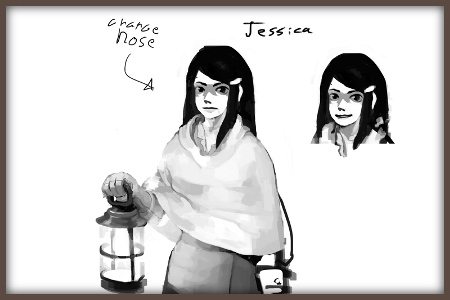
Like it?
So yeah — we’re working hard, Cinders is steadily progressing, and while we’re experiencing some hardships, I firmly believe the future ahead of us is bright. The weekly blog should be back from now on, too.
Cheers!
Aug 9, 2011 by TeeGee
So yeah, as you can see, I haven’t updated the blog since a few weeks now. And I probably won’t until Cinders‘ release, too.
The reason is as prosaic as it can get — simple lack of time. I used to write the blogs on Saturday mornings or Friday evenings, but it’s Summer now, and I prefer to take at least some advantage of the weekends whenever I can. And on the weekdays, I’m spending almost every waking minute working on the already delayed Cinders. If I would be up for writing something, it’d better be some in-game dialogue.
That said, I very much enjoyed writing the blog, and it felt great to see that it actually gets some readers. I look forward to getting back to it when everything calms down. I have some nice ideas for future articles, and I also plan a full Cinders post-mortem at some point. With sales numbers, production details, what went wrong/right and all that.
Sorry for the silence, and stay tuned.
Jul 8, 2011 by TeeGee
Continuing on the trend from the last week, here’s some more MoaCube’s stats. This time: our biggest traffic sources, along with some notes on how we got there (thanks to Paul Eres of RPGcreations for the suggestion).
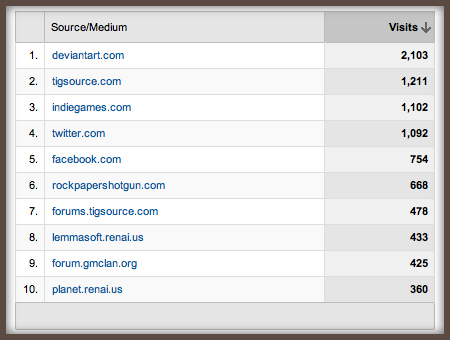
I filtered out direct visits and google searches (1st and 4th position respectively), and focused on the referrals. As you can see, we’re still pretty small, with overall traffic measured in thousands per month and hundreds per day. We were growing really fast during the first two months, but now we’ve hit the stage where each months visits are just a few percent higher than the last’s. I’m interested in how this will change after Cinders is out. I’ll be sure to blog about it, too. Now, onto notes:
1. deviantart.com
This is probably a surprise for many. Our biggest traffic source, and by far, is Gracjana’s profile on deviantart. It didn’t really require much work, too. She’s a popular artist with many followers, so anything by her picks interest. Some of her Cinders artwork was featured in Daily Top Favorites and Daily Deviations, leading to very nice traffic spikes. It’s not dead traffic too, we have some confirmed sales from this source. Seems that if you work with a good and popular artist, it’s a good idea to ask them to promote the game on their profile.
2. tigsource.com
We were only mentioned once on the front page, and it was enough for TIGS to become our 2nd best referral. Kinda depressing, knowing that if you are not making a retro-styled game, or don’t know the editors personally, your chances on being featured are very slim. I got there by pestering an online friend who writes for TIGS. I don’t think it will be possible again. We kinda sticked out as the only hi-resolution 2D game in a long time.
3. indiegames.com
We got noticed by one of indiegames editors after the TIGS feature. Since then, we’re in direct contact, got our trailer published, and it’s likely you’ll see Cinders and our future projects there.
4. twitter.com
Twitter is interesting. It’s currently our 4th best source, but it’s constantly creeping up, as my account gains followers. It’s especially effective for promoting my blog posts. They tend to be retweeted the most, getting many people to visit. It should be noted that only 35% of this are new visits, so it’s more suited for maintaining traffic than increasing it.
5. facebook.com
Facebook is very similar to twitter in that it mostly maintains traffic (only 23% new visits) and grows steadily. It seems weaker than my twitter, but I had it for much shorter, too.
6. rockpapershotgun.com
A very cool PC-centric gaming website, that doesn’t shun away from indie games. I knew one of the editors from my days at Codeminion, so it was easy to establish the contact again. To make them publish indie news, you need to at least have a video of your game.
7. forums.tigsource.com
I’m a relatively active member of TIGS forums. I have links to our website in my signature, and I have made threads about our games in DevLogs and Feedback section. It’s a passive traffic source of sort — I spend my time there anyway.
8. lemmasoft.renai.us
A visual novel centric forums I signed to when we started to promote Cinders. I was a bit afraid that people there wouldn’t like a non-anime visual novel, but the community seems to be very friendly and supportive. Got some nice feedback and several sales. Very valuable traffic.
9. forum.gmclan.org
A Polish GameMaker community. I’m relatively well-known there, so it brings some people to our website. Mostly dead traffic, unfortunately. Very few Polish gamers are interested in buying indie stuff online.
10. planet.renai.us
An RSS aggregator for lemmasoft forums. If you publish VN-related news on your website, you can request being added to its feed. It reposts my news and blog posts in whole, so exact traffic is hard to measure.
As a little extra, here’s a list of the most popular content on our website:
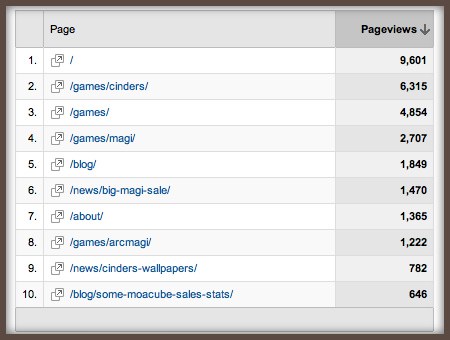
Nothing unexpected here. Main subpages and games are getting the most eyeballs. From more interesting stuff: Cinders wallpapers are pretty popular, and so is my blog post on our sales stats. People like stats, I guess.
I would be really interested to see a similar breakdown of traffic sources from other indies. In a way, it’s more useful than sales numbers. Shows where and how to promote your game and website, and what people like to read the most.
C’mon, don’t be shy.
Jul 1, 2011 by TeeGee
The blog was meant to become a bi-weekly thing until Cinders‘ release, but this could be interesting for many, so there you go.
Today, we’re getting our first payment from BMT Micro. I thought I could share some stats and few quick observations.

- Magi is still selling, even after so many years.
- $5.95 Magi sells the best, but only slightly better than Cinders $19.95 pre-order.
- Not much interest in Magi Supporter Bundle (the one for $25).
- Judging from Cinders pre-orders, our Mac audience is very small. App Store to blame? Or just bad marketing?

- Magi $50 Investment Bundle was a big success. We may do something similar in the future.
- Magi for $5.95 didn’t get that much profit. So much for the “if your games would be cheaper, you would get more sales and profit” theory.
- Magi contributed much more to our profit than I thought it would.
- Cinders pre-orders at $19.95 both sell a lot and earn a lot. Vicinity of $20 still the sweet spot?
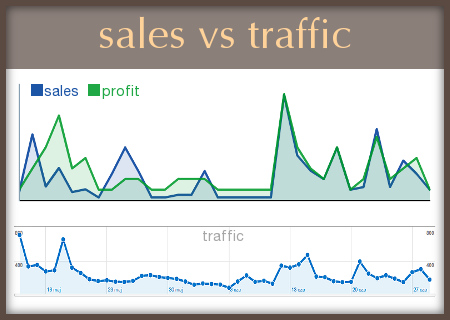
- No surprises here. More traffic = more money.
- The sales spike without a traffic spike (at around 25% in) is from Pig-Min’s feature on Magi. Shows that traffic can have different value.
- The largest sales spike is Cinders pre-orders launch. Much less of a traffic spike there. Shows that there were some fans waiting for it.
I’m not comfortable with disclosing our exact numbers just yet, but in general — if this was to continue — I could already make a modest living out of it. Gracjana — Cinders artist — not yet. She gets half of Cinders profits, but its Magi sales that contributed a lot this month. Shows the value of having an existing games for passive income. Of course, this is just for pre-orders. Actual sales should be much higher, especially with the affiliate deals we’ve secured.
I think we should start making some reasonable money, to let us make games, pay bills and eat food at the same time without taking an extra job, after our next release. Though, everything seems to point out that our next project is also going to be the hardest. With Cinders, we had some savings from our former job to kickstart us. But our next title will have to rely on whatever we’re able to get with Cinders. Which may be just a bit too little. We’ll see how that goes. In the worst case, it may make sense to borrow a small sum from friends to finish it up, as it should be much easier from the second game on.













